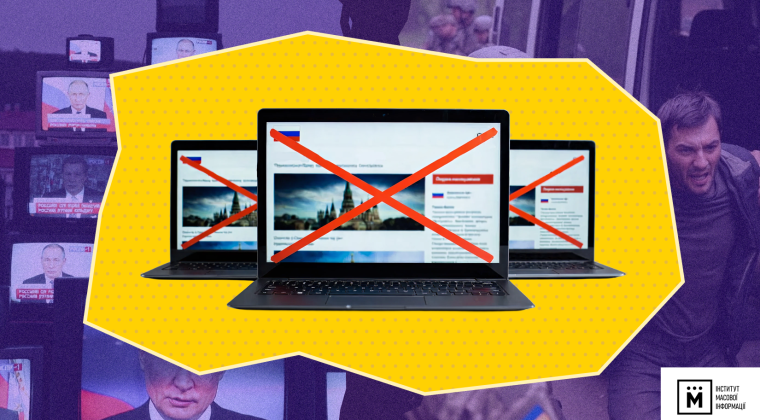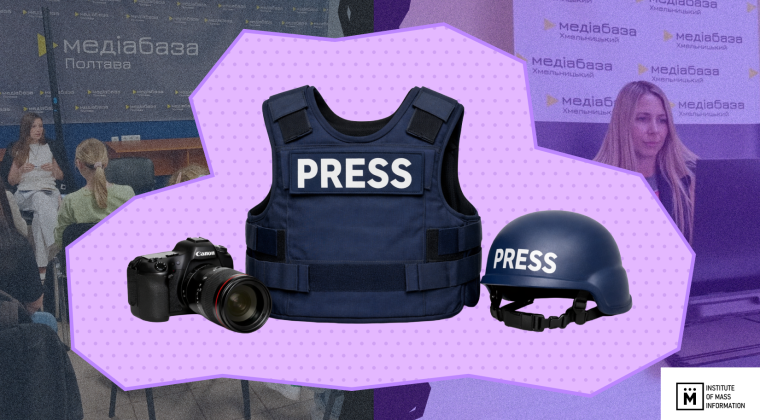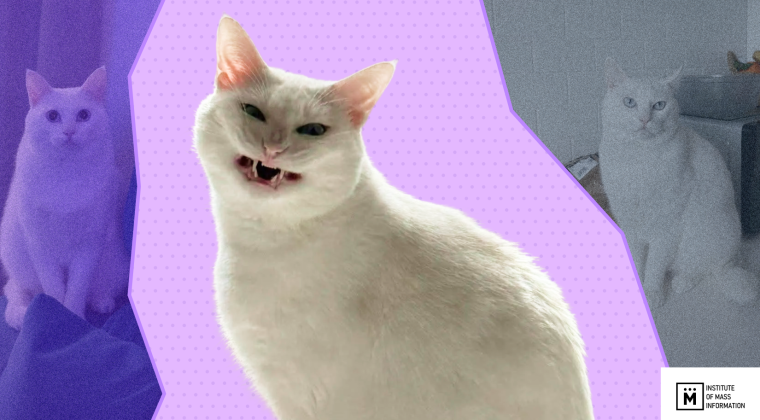The Russian media industry can basically be divided into two large categories: the pro-state bloodsuckers and the selectively blind imperialists. The difference between them is simple: for instance, the bloodsuckers cheered on the annexation of Crimea loudly, while the subtler imperialists supported it “soft power” style – by using the word “accession” in their decepitvely “balanced” news or displaying maps of Russia that included the Ukrainian Crimea. The imperialists can also be distinguished by the “foreign agent” badges that they proudly hang on themselves even if they are based abroad. The soft imperialists’ selective blindness prevents them from seeing both the bloodsuckers’ crimes and themselves in the mirror clearly.
On November 4, the Russian “Meduza” published an interview with Ukrainian journalist Natalka Humeniuk. Natalka’s answers were brilliant, while the unnamed “Meduza” journalist’s questions were frankly biased. One of the questions concerned the aggressive propagandist Anton Krasovsky, who had called for drowning Ukrainian children and burning them to death in their own homes. “Meduza” compared Krasovsky to Ukrainian journalist Fahrudin Sharafmal, who broke down in tears on the air of Channel 24 in March (at the beginning of the war) over the death of his friend, marine officer Pavlo Sbytov, and said the following: “We need victory, and if we have to kill all your families for that, I will be among the first to do it. Glory to the nation. And let us hope that such a nation as Russia will be gone from this Earth for good, because they are bastards who poison the land.” The Committee for Journalistic Ethics responded to the host’s statement, Sharafmal himself publicly apologized on the air of the same channel, and the CEO of the “Lux” holding condemned the channel employee’s actions.
Aggressive Russian propaganda was actively comparing the cases of Krasovsky and Sharafmal, putting special emphasis on the fact that the Ukrainian host kept his job at the channel. The Russian media has been portraying Sharafmal, an ethnic Afghan, as a Nazi since March, stressing that he works for a holding company owned by the Lviv Mayor. As we can see, “Meduza” failed to avoid the “Krasovsky–Sharafmal” comparison, too.
Even though the Ukrainian journalist’s statement was shameful and unacceptable, it was a one time incident, not a part of state policy, not funded or inspired by Bankova St., and was caused by emotions evoked by a personal tragedy.
Let’s take a closer look at the situation with pro-Kremlin journalist Anton Krasovsky.
On October 20, during his program “Antonyms” that airs on the Russian multilingual state TV channel RT, he called for murdering Ukrainian children. This was how Krasovsky, then a presenter and director at RT, reacted to the story of his guest, Russian science fiction writer Sergey Lukianenko. Lukianenko shared his memories about being treated for asthma in the Carpathians as a child back in 1980, and meeting Ukrainian children who believed that “Ukraine was occupied by Muscovites and, were it not for the Muscovites, they would be living like the French.” The program was pre-recorded and, despite the opportunity to edit the undesirable moments out, it reached the Russian audience with a number of bloodthirsty statements.
Krasovsky’s regular viewers, as well as those Russians who watch and listen to Moscow-financed media resources in general, can hardly be surprised by calls for violence. As we said in our earlier survey, genocidal rhetoric regarding Ukraine and Ukrainians is par for the course in the Russian media space. Statements similar to Krasovsky’s are not an exception, but part of a pattern.
Take Krasovsky, for example: in January 2022, he threatened to burn Ukrainians to death on Khreschatyk along with the Ukrainian Constitution. This is just one of many similar statements he has made. Even then, it was not the mythical Nazis he was calling to murder, like most Russian pro-state journalists did at the start of the invasion, but Ukrainians – before it was cool, to use a slang expression. This Kremlin minion never worried about the ethics of his statements when it came to the so-called “Ukrainian question,” and up until recently, the Kremlin was fine with it. In September 2022, Russian Foreign Ministry spokeswoman Maria Zakharova called Krasovsky “a fantastically talented man” and praised him for “saying obvious things in his own manner, according to his education and intelligence.”
However, this time, something went wrong with the calls for murder of Ukrainian children. The “higher-ups” were quite indignant at Krasovsky’s words, or at least pretended to be. The head of Russia’s Investigative Committee, Bastrykin, ordered an investigation into the journalist’s scandalous statements (based on which article of the law, we do not know. – Ed.), and the head of RT, Simonyan, announced that the channel temporary stopped working with Krasovsky. Simonyan announced the decision on her Telegram channel, albeit four days after the incident, (or, to be more precise, after the calls by her fellow journalist “surfaced” in Twitter‘s English-speaking segment).

Screenshot from Margarita Simonyan’s Telegram channel
However, less than two weeks since Krasovsky’s “suspension”, he reappeared on RT as the host in a new installment of the “Russia: XXI Century” project, dedicated to Russian sports. On the Telegram channel, the journalist explained that the program had been filmed a while ago and he had not been reinstalled anywhere. However, the television company has not yet announced appointing a new RT director to replace Krasovsky. It is unclear how long the “suspension” of collaboration will last, because there has been no talk of a complete termination of work relations.
It is also telling that Simonyan, Russian government officials, and Kremlin media resources who condemned Krasovsky were only outraged only by his latest statement about Ukrainian children. They said nothing about the fact that during that same October 20 program, the TV host also made fun of elderly Ukrainian women who had been raped by Russian troops (the journalist declared that “those grannies would even give their funeral savings to be raped by Russian soldiers!” – Ed.). When Lukyanenko said that Ukraine should only be allowed to exist because “many people whom one wouldn’t want to share a country with will remain there,” Krasovsky, with outstanding nonchalance, suggested to solve the problem by shooting down everyone who is disagreeable, which was also received routinely by the Russian media space.
Despite the obvious inadmissibility of Krasovsky’s statements and the backlash that arose, primarily, in the Western media, Russian propaganda seems to have managed to use the incident to its own advantage. How? Seeing as Russian officials and Kremlin aides strongly and publicly condemned Krasovsky immediately after the information was “leaked” and were acting astonished by his scandalous claims, one could get the impression that something like this had happened in the Russian media space for the first time and was something extraordinary, not at all an instance of systematic genocidal rhetoric which is part of the Russian Federation’s state information policy. Namely, Simonyan called Krasovsky’s remarks a “passing craze” and assured that neither she nor the rest of the RT team shared his opinions. Trying to explain himself on Telegram, Krasovsky said that he simply “got carried away” and “failed to see the red line, with the children.” So, before we make any assumptions as to why the RT employee acting “on brand” stirred up such an outcry in Russia this time, let’s see how often the Kremlin media make calls for the murder of Ukrainians and why the “Krasovsky case” is actually a regular occurrence, and not an accident, as the aggressor country is trying to make the world believe.
On February 24, RT host and director Krasovsky, who is now making calls for the murder of Ukrainian children, was more restrained. Similar to Solovyov, his colleague in the propaganda department, Krasovsky admitted that “war is evil”, but wrote about it as if it were something necessary and inevitable.

Screenshot from Anton Krasovsky’s Telegram channel
On October 8, Krasovsky publicly claimed that Ukrainian cities should be bombed on his Telegram channel. No one in the Russian media field condemned these calls.

And this is what Krasovsky wrote on the morning of October 17, following a mass suicide drone attack on Kyiv, which killed four people, including a pregnant woman:

On July 15, on the Mourning Day in the city and the oblast, announced by the Vinnytsia City Council, RT director Krasovsky wrote a bloodthirsty post saying that “Vinnytsia is not enough!” and added that he was waiting for a “real solution. An armed one!”
And even that was not enough. On July 21, Krasovsky (one of RT’s executives, mind you), called for nuclear strikes on Vinnytsia and Khmelnytsky.

These statements serve as proof of the bloodthirsty policy implemented by Russian state television – an authorized accomplice in the crime of genocide. These remarks are also a testament to the selective blindness of the “soft imperialists”.
The Russian Federation has been employing genocidal rhetoric while talking about Ukrainians for a long time. The shift is merely in the degree of aggression: from a narrative about Russia being “forced” to attack Ukraine for the sake of goodness and protecting the homeland to direct calls for exterminating Ukrainians.
Let’s go back to the backlash against Krasovsky’s statements about Ukrainian children and his surprisingly quick comeback after such a wave of indignation and condemnations. What was the initial reason for such a response among the Russian media and officials? Why did most of those who typically do not shy away from genocidal rhetoric themselves demonstratively decry the inadmissibility of Krasovsky’s opinions? It is telling that some Russian officials could not refrain from genocidal rhetoric even as they were expressing outrage at the RT employee’s statements. For example, Novosibirsk deputy Rostislav Antonov explained that one cannot wish death upon Ukrainian children, because those children are “ours, too.” In this way, the Russian official once again showcased the goal of the aggressor country – to erase the Ukrainian national identity. Another official, State Duma deputy Sergey Mironov, called Krasovsky’s statements “informational Banderitism”, that is, he restored to the traditional Russian strategy of shifting blame and using “newspeak”. Actually, it is also unclear why the previous statements uttered by the RT director and other pro-state journalists went unnoticed by everyone or were perceived as “the author’s personal style.”
There are several theories as to why representatives of the Russian media and authorities resorted to public condemnation of Krasovsky. The first and perhaps the most obvious explanaiton would be that they wanted to prevent a complete international ban on RT after the genocidal statements were leaked to the English-speaking Internet. After all, despite the fact that the head of RT, Simonyan, is under sanctions, and multiple civilized countries have revoked RT’s broadcasting licenses, the content of this Russian state TV company is still available to satellite television viewers. The second explanation as to why the “bullying” of Krasovsky commenced may be related to Russia’s desire to make credible international institutions, media experts, and law enforcers believe that the aggressor country is keeping its information space in check for extremist statements and genocidal rhetoric. This time, the information spread beyond Russian borders before the “Antonyms” episode could be removed from RT’s official platforms (currently, you can find only the clip with the odious remarks, but not the entire episode of the program online. – Ed.). Due to the powerful backlash at Krasovsky’s words, those who do not monitor how often Russia restores to genocidal rhetoric could get the false impression that the incident is a performer’s misdemeanour, and not the aggressor country’s deliberate information policy. Commenting on the Krasovsky scandal on the air of the Russian-language telethon “FreeDom”, Russian political scientist Olga Kurnosova remarked that “it turns out that there are ‘red lines’ for the Kremlin, too.” In fact, discussions about moral boundaries can serve to divert attention from Russia’s systematic violations in the media sphere. Or, if certain undesirable information leaks out beyond the Russian Internet again in the future, the Russian Federation will be able to easily “pass the buck” to another scapegoat, referring to the famous “Krasovsky case”. And the subsequent comeback of odious persons can be explained by, say, everyone’s right to work – even more so with regard to the culprit’s “sincere” repentance. After all, some state media workers may have been so outspoken in their criticism of Krasovsky to divert attention from their own misdeeds for fear of future punishment. This, too, is something that should not be dismissed with regards to the UAF’s battlefield successes and the international practice of prosecuting those guilty of incitement to genocide.
Alyona Nesterenko, Oksana Romaniuk



